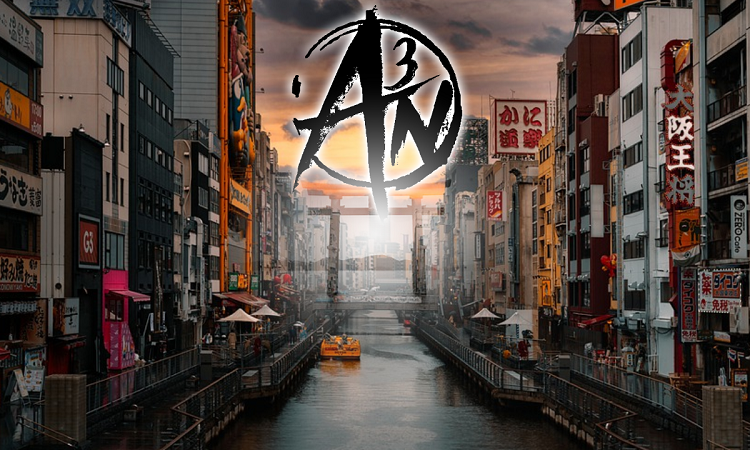
7 Agorist Elements of Japan, Under Attack
Before anyone gets their fundoshi in a wad, yes, from a general view, Japan is a collectivist culture. Also, statism holds sway. This article, however, aims to focus on the lesser-known (but very prominent locally) positives of the country many are unaware of — the agoristic elements of life in Japan, if you will. Also how these freedoms are now under heavy attack by the state.
Drinking in public
Drinking may not be agoristic or counter-economic in and of itself, but freedom and relative lack of statist laws and regulations is. One of the coolest things about agorist Japan is that you can drink basically anywhere, anytime. On the train. On the bridge. In the park. At Denny’s. Even riding in the passenger seat of your best friend’s car (open containers in vehicles are okay as long as the driver isn’t drinking). Further, public intoxication is not a crime, and people here — even cops — tend to just treat drunk people like children who need a little extra help.
One of my fondest personal memories of this Japanese liberty in libation was seeing a salaryman passed out on a famous bridge here in Niigata City. Laying on his back in his suit, belly up toward the night sky as the Shinano River passed lazily beneath him. A passerby leaned down and said, “You okay?” The man managed a feeble-handed gesture of acknowledgement and groaned, “I’m alright”, before going back into his booze-induced coma.
How it’s under attack: “Covid” curfews and government initiatives shaming restaurants, nightlife spots, and individuals out past 8pm to have fun, in order to “stop the spread” are killing the buzz. Tokyo has gone full draconian recently, mandating that all restaurants and bars no longer serve alcohol. Initially just suggestions, restaurants can now be fined for staying open, and police are roaming the streets with clubs in hand, to intimidate people and discourage them from staying out.
Not all Japanese are taking it lying down, however, one testament to which is this brave spirit pulling up outside the governor’s house demanding she think about the lives she is ruining, and the rising suicides from the destroyed economy. “Hey! Yuriko Koike! Do what’s right! Get your ass out here! We’re pissed!”
Gardening, Farming, Selling produce
Japan’s deep connection to nature is hard to overstate. With the native religion, Shinto, being a direct worship of nature via pantheon of gods for everything from trees to waterfalls to mountains, it’s not hard to see why. Even walking through semi-urban areas one will find gardens scattered about, “veggie lockers” where local produce is sold by way of inserting coins and taking what you need, and stands set up on the side of the road with farmers selling extremely fresh, local produce.
There’s no need to be licensed to do this. Some people grow veggies. Others want to buy them. Bada-bing-bada-boom. There’s a lot of sharing within small communities, too. Whether it’s a roadside fruit stand or some ancient grandmas camped out in a residential street selling giant radishes, red tape is largely not an issue, as far as I can tell.
How it’s under attack: Seed laws protecting Japan’s diverse local variety of crops are now being threatened by transnational corporations and globalist interests. While unfortunately, this battle is still one of violent states — small, prefectural governments versus megalithic global government interests — the power dynamic is leaning in the wrong direction, and small farmers are suffering.
A change in seed laws in 2018 meant that local farmers now are undercut by mega corporations like Dupont, Monsanto, and Syngenta-ChemChina.
In short, big-government lobbyists are strong-arming smaller Japanese prefectural governments and local seed producers, forcing them by law to disclose information, thus commandeering the market. Since the seeds these agribusiness industry giants produce are genetically modified, seed lines can’t be saved and planted again like locally produced varieties.
Unschooling and Homeschooling
Most imagine Japan to be a collectivist hell when it comes to education, but in some ways it’s easier to homeschool or unschool your children here than in many other countries, including areas of the United States. The reason why is hard to say, but most Japanese, even at an institutional/governmental level, still view the family as a private unit not to be meddled with. People are shy, and prying into other people’s business is not a good look socially.
As long as parents are showing an effort to provide their child with an education of some sort (a constitutional right for the child), they can usually just say their child is not a good match for or hates school and opt out. There are a number of “free schools” (jiyuu-gakou) across the country for these so-called “school refusers” (futoukou), and they range in terms of quality. All this is to say, if you don’t want your child at the indoctrination camp, they probably don’t have to go, and doing one’s own thing is usually pretty painless.
How it’s under attack: As contact tracing and vaccine record keeping systems are pushed and propagated more and more by politicians and mass media, it stands to reason that being able to keep one’s child out of school privately will become less and less hassle free.
Medical Freedom
Due to a highly publicized spate of vaccine injuries connected to the MMR and HPV vaccines historically, a large percentage of Japanese are hesitant to trust big pharma with their health. When it comes to the rollout of the coronavirus jab (due September in Japan for the non-elderly, non-healthcare-professional populace) opinion is divided. Some groups are angrily demanding the vax sooner. Other, very vocal groups boldly going against the strong social pressure to conform, want nothing to do with it.
As Bloomberg reported at the end of 2020:
“Japan has one of the lowest rates of vaccine confidence in the world, according to a Lancet study, which found that fewer than 30% of people strongly agreed that vaccines were safe, important and effective, compared with at least 50% of Americans. A recent poll by Japanese public broadcaster NHK found 36% said they didn’t want to take a Covid-19 vaccine.”
How it’s under attack: Well, in a sentence: the vaccine passport scamdemic, and covid propaganda campaign is brainwashing many into blind acceptance of big pharma, making those that question look increasingly like “the dangerous outsider,” a position no one here in socially sensitive Japan wants to occupy.
Cash-based society / Crypto Society
The Japanese typically love cold, hard cash. Paying for small purchases with a credit or debit card is still basically unheard of. A far cry from my college days in the states, flipping plastic for a two-dollar donut and gas station coffee in the morning. Japan also loves crypto, as recently emphasized by record-breaking deposits on major Japanese crypto exchanges.
At one point, ground-level, peer-to-peer private exchange of cryptocurrencies was growing very rapidly in Japan. Since many businesses already accept a variety of smartphone-based digital payment systems, crypto onboarding has been very successful in some areas. To get an idea, just check out this map of stores in Tokyo where bitcoin cash is accepted. An active community of “adoption ninjas” and true believers is still very active and growing in Japan, but the stakes grow higher every day for being free, as violent financial parasitism continues to grow.
How it’s under attack: Increased regulatory pressure, taxes, and legislation classifying businesses and individuals dealing in crypto as “Virtual Asset Service Providers” (VASPs) have stifled the once beautiful Wild West crypto Mecca of Tokyo, seeing massive financial institutions and corporations attempt to ride on the coattails of the freedom bitcoin brings, shit on small businesses, and pretend they’ve done Satoshi Nakamoto a favor. They’ve chosen to ignore how the crypto they claim to support started — an anarchist money that “would allow online payments to be sent directly from one party to another without going through a financial institution.”
Starting a Business
No fire escape? No problem. Your sushi restaurant is just your fucking living room? Nice. Your inner-city shop is a combination laundromat, exotic pets store, and voodoo throwing knife dealership? Sweet, you on Google maps? Okay, I exaggerate a little, perhaps. But not that much.
When it comes to starting a small business, Japan is pretty lax regulation-wise compared to other areas of the world. I once visited a jazz bar that was basically just a tiny room, almost like an attic, on the third floor of a rickety old building in the city. There was one way in, and one way out (maybe there was a fire escape, I don’t know, but still) — a terribly narrow and steep wooden staircase. The place was packed, and if there had been a fire, jumping out of the window probably would have been the most solid bet. While there are definitely laws, things are a little…different. It’s also easy to serve alcohol in Japan, as no license is required as long as you’re not selling bottled booze to take home, as would a liquor store.
How it’s under attack: With the aforementioned economic destruction perpetrated by the “Great Reset” of covidiocy, many smaller businesses simply cannot afford to keep the shutters open. Bigger biz and corporations are the ones that survive, and as they take over the landscape, so do the governments they are supported by. With that comes a lot more red tape.
Being Naked When I Fucking Want
Alright. This is the last one and granted, it may be a bit silly, but have you ever been to a Japanese hot spring (onsen)? Ever been to a “naked festival” mid-winter at a Shinto shrine in a traditional loincloth moshing around in the snow and holy buildings for lucky wooden chips thrown out by priests while volunteers spray saké into your mouth from water bottles and other loincloth dudes yell and slap your bare skin? Uhh…me neither.
Basically, Japan is a land of body positivity in many senses, and religious shaming such as the western “Catholic guilt” about the body really doesn’t exist. Sex is good. Hot springs are good. Snow moshing is good. And really, people don’t react to nudity, generally speaking, in the scandalized way they often do in the west. What’s any of this have to do with agorism?
Well, suffice it to say that the closer we are to nature, reality, and self-acceptance, the further we get from destructive ideas teaching us to look to “authority” for approval about ourselves. The state — the world’s biggest and most violent cult — like other religions, always wants us to feel guilty about our own power, our own individuality, and our own ability to get along with others absent an authority figure.
Historically, the hot spring and public bath have been great social levelers in Japan. In the bath, everyone is exposed as they are: there are no rulers, no kings, no peasants. No way to flex with fancy jewelry, clothes, or titles. In so many ways, Japan exemplifies the ability of people to get along without the presence of a state. Now, if only the masses of these beautiful people could realize it.
How it’s under attack: In a stupid word, covid. The psyop has wreaked untold economic and social havoc, closing hot springs, canceling thousand-year-old traditions and festivals, destroying Japan’s lively tourism industry, and leaving many communities demoralized in the empty silence, where normally taiko drums would be booming, people laughing and dancing in their festive summer jinbei, and drink flowing.
But. We’re not giving up. Fuck that.
GANBARE, Agorist Japan!









